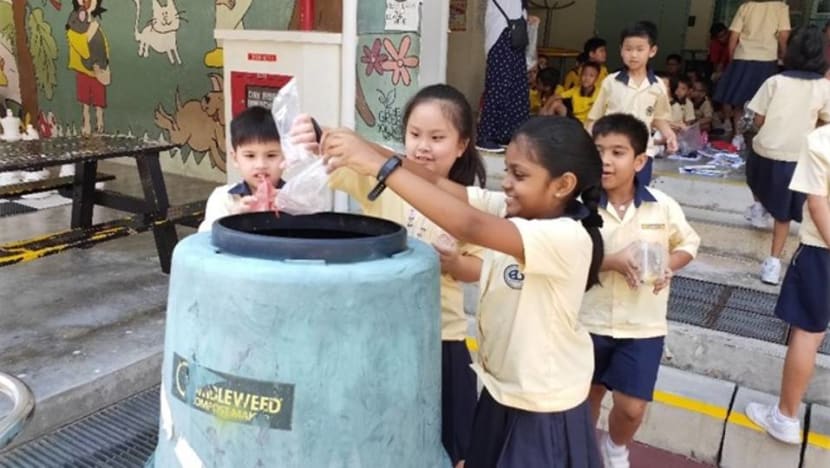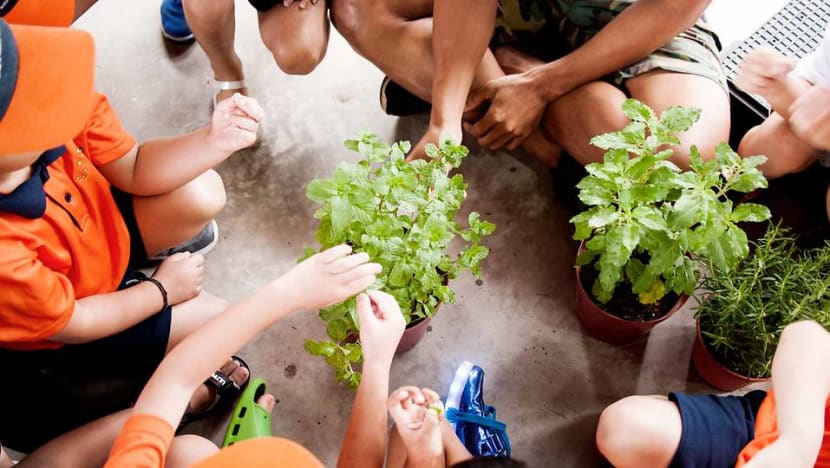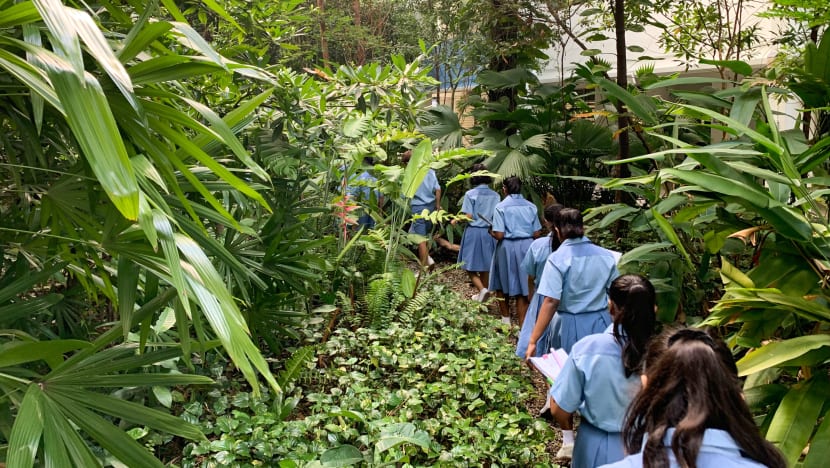commentary Commentary
Commentary: Sustainability cannot just be taught in geography lessons
Young people need to be engaged with the wider world and this means rethinking how we teach and the way we craft our curriculum, says the Co-Chair of the NIE Sustainability Learning Lab.

Elias Park Primary School has four electric biodigester machines and three manual compost bins that produce fertiliser for the school gardens. (Photo: Elias Park Primary School)
SINGAPORE: On my desk, there once stood an ant colony, housed in a landscaped glass case. It was fascinating to see how fundamentally connected each individual ant was to the larger whole, united in the goals of survival and growth.
Perfectly organised as they were, however, the ants remained cut off from the natural ecosystem.
Whenever I am asked how schools can contribute to sustainability efforts, my mind goes back to this colony. Ants in the wild feed on organic waste, contribute to soil aeration and fertility, and interact with the environment in a multitude of ways.
Safe within their glass walls, my ants carried on with their daily business, busy and prosperous, but artificially disengaged from the world and their environment.
READ: Greater participation in green workshops, amid calls for more climate change education in schools
Educators agree that schools have a duty to develop the knowledge that students need to understand and engage with important issues affecting society. In announcing the Eco Stewardship Programme (ESP) this year, Education Minister Lawrence Wong highlighted education’s importance to sustainability efforts.
Indeed, both the Science and Humanities curricula have been refreshed and enhanced to provide students with the knowledge they need to make better environment-related decisions.
For example, the geography curriculum from Secondary 1 to Junior College explicitly links diverse topics like water, weather and climate, transport, housing and urban development to sustainability.

Educators also agree that students should learn about environmental management in an authentic manner. At the Sustainability Learning Lab at NIE, for example, student teachers learn directly through our raingarden about the role of these gardens in improving water quality and managing urban flooding.
While such environmental knowledge is undoubtedly important, environmental education research has indicated that it is insufficient. Students, in fact, need to acquire knowledge of how to take environmental action, and also gain practical and successful experience in addressing environmental issues.
VALUE OF INTER-DISCIPLINARY LEARNING
This implies a need to more closely examine how we structure learning about the environment within school curricula and programmes. Environment-related programmes in schools are often part of the co-curriculum, such as Co-Curricular Activities and Values in Action, and are largely distinct from other school subjects.
READ: Solar power for most schools as MOE aims for 2030 carbon-neutral target
At the same time, references to environmental values within these subjects tend to be limited to understanding and appreciating the environment, and learning about the environmental responsibilities of individuals and states.
Some exceptions are schools with Applied Learning Programmes or Learning for Life Programmes focused on environmental education or sustainability. The 2021 Lower Secondary Geography curriculum also requires students to conduct field-based investigations about real world sustainability issues, and then use the data collected and conclusions drawn to take action.
For example, students could carry out investigations on how residents use the facilities in a neighbourhood, and then make suggestions about how communal spaces can be better utilised.
This is significant because it concretely ties subject knowledge to action in the mainstream school curriculum.
In order to take effective environmental action, however, students need to have knowledge of how to participate within the public sphere. For example, individuals who wish to reduce packaging waste need to know how to persuade industries to redesign, or convince governments to regulate, the packaging of consumer items.
READ: Commentary: Work of Singapore climate activists has only just begun
One way to effectively engage students on sustainability issues is to explicitly provide opportunities for students to combine the environmental knowledge learned in Geography and Science with knowledge about governance learned in Social Studies.
The Social Studies curriculum explicitly discusses avenues for citizenship participation, including the use of different communication approaches and feedback channels, and the role of organised groups in Singapore.
CREATING OPPORTUNITIES DESPITE CHALLENGES
However, teachers face challenges like time and resource constraints, as well as pressure to focus on preparing students for exams, when designing inter-disciplinary work.
Some teachers may also not be clear about how to help their students take action on environmental and sustainability issues. In my courses, I noticed that while teachers could easily identify environmental issues like the misuse of recycling bins, they were unsure about who to approach to run a neighbourhood informational campaign on proper recycling procedures.
There is a need to relook the ways in which schools plan the curriculum, and allocate time and human resources to environmental education.
The ESP emphasises the importance of strengthening school partnerships with government bodies, researchers, industry, and/or organised groups operating in the environmental and sustainable development spheres.
In fact, there is growing interest by government agencies and grassroots organisations to support the implementation of sustainability solutions generated by students. Schools can benefit from such expert input to identify authentic problems and implement efficacious solutions.

For example, an individual school interested in reducing food waste from the canteen can easily encourage students to buy or bring only enough food as needed. However, the school can achieve more by working with partners who have existing food redistribution networks in the community.
The impact of school-based waste reduction programmes can also be enhanced by partnering organisations that have knowledge of strategies for composting food waste for use in school gardens or for distribution to community farms.
Teachers will also need to develop pathways for students to be involved in such programmes for more authentic learning. For example, primary school students can visit black soldier fly farms to learn about how the flies transform food waste into fertilisers, or be scheduled to help out in school gardens.
Older students in secondary school and JC can be directly involved in working out collection points and distribution systems, and can deliver school talks for new students to recruit volunteers to sustain the initiative. In fact, students can also critically consider more efficient ways of collecting, composting, or distributing food waste.
Finally, schools need to provide more structural support, like timetable common free periods, for innovative teachers carrying out the complex task of developing interdisciplinary curriculum and programmes.
READ: Commentary: Climate change in Singapore and what the future brings
This involves co-producing curriculum goals with their colleagues from different subject areas, and also with community partners, who may have different goals and cultures from schools.
Unlike the ants that lived on my desk, young people are fundamentally embedded within society. Schools need to prepare citizens who have not just abstract environmental knowledge, but who are also experienced in applying this knowledge to address sustainability issues that affect society.
Finally, we need to leave the familiar and known boundaries of the school and venture out into the community to help build robust environmental and sustainability education programmes for our youth.
Dr Tricia Seow is a senior lecturer from the humanities and social studies education at the National Institute of Education, Nanyang Technological University, Singapore.














